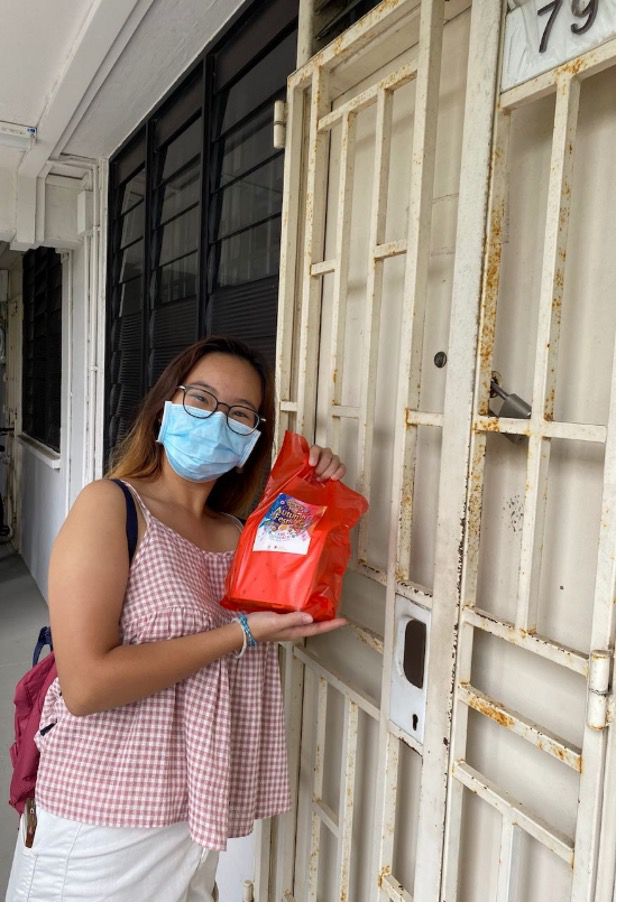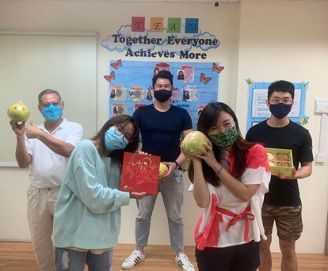Social sciences student Sui Hui Ping realises through a personal volunteer burnout episode that the only way to effectively help others is if you’ve first taken care of yourself.

Hui Ping during a Chinese New Year outreach drive
I strongly believe in volunteering and giving back to the community and especially seek to serve the vulnerable and the voiceless.
Thus, I am always on the lookout for volunteering opportunities as I hope to do more for the marginalised in society. In fact, I have just completed an internship at Prudential’s Community Investment team where I helped to spearhead a seniors’ programme aimed at empowering seniors to take charge of their personal wellbeing - like managing their own diet and finances.
During my internship, I was reminded of a vital lesson that I would like to share with fellow volunteers: our empathy and love for others must be balanced by self-love and resilience; if not, we will experience volunteer burnout. I learned this the hard way with a first-hand experience during my first semester at SMU.
Unlike most polytechnic engineering students who continue university studies in the same field, I took a leap of faith and ventured into a completely different– psychology. To make matters a little more complex, my first semester lessons were held online due to the Covid-19 pandemic, which caused me to be unable to form a social support system at university.
My first few weeks in school were extremely stressful and overwhelming, and this affected my sleep. I would spend nights ruminating on my studies instead of having proper restful sleep. Despite the stress and lack of sleep though, I still made a conscious effort to attend my volunteering sessions. I believed that my passion to serve would sustain me no matter what trials I faced.
During this period, I would spend up to 10 hours each week volunteering in three different organisations. However, because I was also involved in many school and CCA meetings, it came to a point where I had no choice but to cancel some volunteering appointments because of the clashes in time. When these happened, I felt immense guilt, and found myself trapped in a cycle where I would blame myself for being irresponsible, and then feel more guilt.
Even during the busy project season, I would still prioritise my volunteering commitments. Slowly but surely, I started to experience burnout: I fell ill and found it difficult to focus on anything.
I continued with my volunteering sessions until a friend advised me to take a step back just before the examinations to allow myself to have a break from these commitments and focus on my studies. It was a tough at first as I was hesitant and felt that I could not just press pause, but eventually I told myself that I had to. The break turned out to be just what I needed; it helped me recharge and prepare myself for the remaining weeks of the semester.
Looking back, I learned that resilience and self-love can and should be practised concurrently. Taking a step back not only helped me recover from volunteer burnout but allowed me to recharge and better serve the organisations and beneficiaries I was volunteering with.
This was evident in my community service project (CSP), Doorstep 125, which aims to find out the needs of impoverished families residing in Jalan Besar and then works with these families to co-curates a programme for them. After my experience with volunteer burnout, I gained knowledge on how to avoid potential future burnout episodes. I learnt to manage my time better and I took regular breaks between volunteer sessions, which benefitted my mental health tremendously. This in turn helped me manage my stress levels better.
One example I recall was during the height of the Covid-19 pandemic when the project team wanted to send residents at Jalan Besar care packages as a form of introduction. Unfortunately, due to miscommunication, the packages were not delivered on time. Previously, I would get extremely anxious and panic. This time, however, I managed to think through the issue methodologically and focussed instead on coming up with a solution. With the other project leaders’ input, we formulated a plan and got five of us to deliver the care packages instead.

Hui Ping (front, left) with Macpherson Member of Parliament Tin Pei Ling (front, right) and fellow volunteers during a Meet-the-People Session.
Through my experience, I know how detrimental volunteer burnout is, and hence how important it is to know when our capacity is reached. Before I experienced volunteer burnout of that magnitude, I always had the perception that we could continue to volunteer as long as we had the passion to. Through all the adversities and sleepless nights, I learnt that while it is vital to be resilient through challenges, it is even more essential to know our own limits and ask for help if we need to. Only by doing so will we be able to manage our own physical and mental health better, and in turn have a greater capacity to serve others to our best.